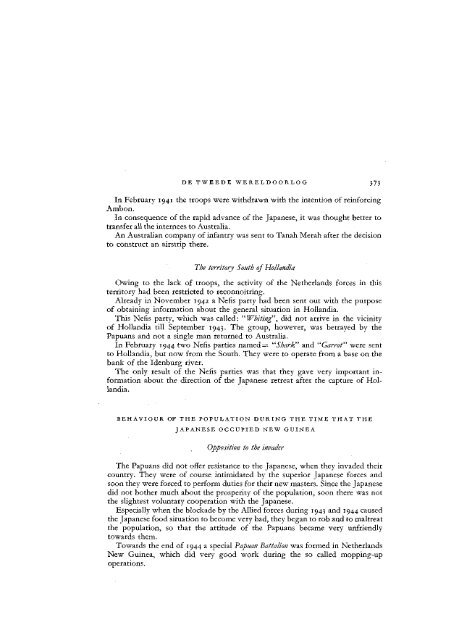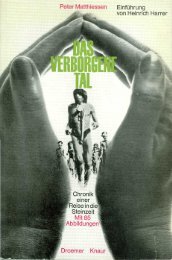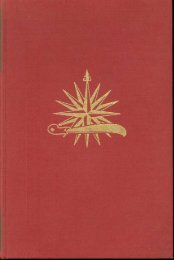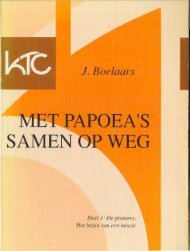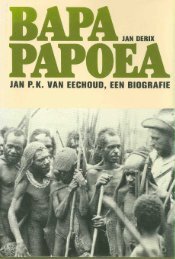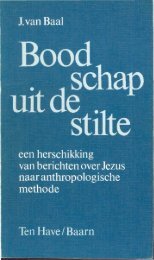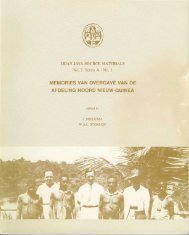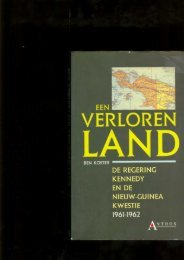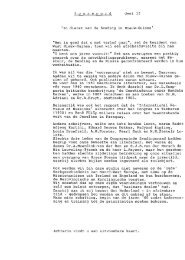- Page 2:
NIEUW GUINEA
- Page 6 and 7:
INHOUD HOOFDSTUK I EXPLORATIE door
- Page 8 and 9:
INHOUD VII HOOFDSTUK VIII DE TWEEDE
- Page 10 and 11:
DR C. SCHUMACHER 1 EXPLORATIE INLEI
- Page 12 and 13:
EXPLORATIE 3 IETS OVER DE WETTEN DE
- Page 14 and 15:
EXPLORATIE 5 afzetgebied de product
- Page 16 and 17:
EXPLORATIE 7 DE TOCHTEN DER PORTUGE
- Page 18 and 19:
EXPLORATIE 9 gaf hij aan Kaap Kolff
- Page 20 and 21:
EXPLORATIE 11 zou zijn. Tijdens zij
- Page 22 and 23:
EXPLORATIE 13 Via Kaap de Goede Hoo
- Page 24 and 25:
EXPLORATIE Fig. 3. New Chart of the
- Page 26 and 27:
EXPLORATIE 17 plaatsbepalingen te m
- Page 28 and 29:
EXPLORATIE 19 Forrest moest er geno
- Page 30 and 31:
EXPLORATIE 21 NIEUW GUINEA TUSSEN 1
- Page 32 and 33:
EXPLORATIE 23 zuidkust af tot Kaap
- Page 34 and 35:
EXPLORATIE 25 Omstreeks deze tijd t
- Page 36 and 37:
EXPLORATIE 27 Straat Lenna tussen d
- Page 38 and 39:
EXPLORATIE 29 gezien hij en zijn tw
- Page 40 and 41:
EXPLORATIE 31 Toen tenslotte in de
- Page 42 and 43:
EXPLORATIE 33 Fig. 6 De tot het jaa
- Page 44 and 45:
EXPLORATIE 35 In de noordelijke Vog
- Page 46 and 47:
EXPLORATIE 37 doorkruisen werd door
- Page 48 and 49:
EXPLORATIE 39 In April 1886 bezocht
- Page 50 and 51:
EXPLORATIE 41 Fig. 7. De tot het ja
- Page 52 and 53:
EXPLORATIE 43 kwam nog, dat niemand
- Page 54 and 55:
EXPLORATIE 45 wonende dwergstam. We
- Page 56 and 57:
EXPLORATIE 47 en de er achter ligge
- Page 58 and 59:
EXPLORATIE 49 van de Marine-vallen
- Page 60 and 61:
EXPLORATIE 51 Noord Nieuw Guinea, m
- Page 62 and 63:
EXPLORATIE 53 Na een korte verkenni
- Page 64 and 65:
EXPLORATIE 55 Tot deze perioden moe
- Page 66 and 67:
EXPLORATIE 57 In het noordelijke ge
- Page 68 and 69:
EXPLORATIE 59 gesellschaft" opgevar
- Page 70 and 71:
EXPLORATIE 61
- Page 72 and 73:
EXPLORATIE 63 Carstensz-toppen opkw
- Page 74 and 75:
EXPLORATIE 65 dagen). De uit Topbiv
- Page 76 and 77:
EXPLORATIE 67 reeds menschen gewees
- Page 78 and 79:
EXPLORATIE 69 De vervolgexpeditie,
- Page 80 and 81:
EXPLORATIE 71 dat de expeditie haar
- Page 82 and 83:
EXPLORATIE 73 westelijke zijtak, de
- Page 84 and 85:
EXPLORATIE 75 kunnen volstaan. Een
- Page 86 and 87:
EXPLORATIE 77 DE EXPLORATIE VAN NIE
- Page 88 and 89:
EXPLORATIE 79 achter de derde keten
- Page 90 and 91:
EXPLORATIE 8l lende Fly een punt ca
- Page 92 and 93:
EXPLORATIE 83 Na het gebied van de
- Page 94 and 95:
EXPLORATIE 85 Van April tot Septemb
- Page 96 and 97:
EXPLORATIE 87 op dezelfde schaal ve
- Page 98 and 99:
EXPLORATIE 89 gebied. Hierbij werd
- Page 100 and 101:
EXPLORATIE 91 logisch te verzamelen
- Page 102 and 103:
EXPLORATIE 93 „De aarde schijnt t
- Page 104 and 105:
EXPLORATIE 95 dit gebied zoölogisc
- Page 106 and 107:
EXPLORATIE 97 Foto Amerikaanse luch
- Page 108 and 109:
EXPLORATIE 99 Nu in westelijke rich
- Page 110 and 111:
EXPLORATIE 101 loop te bereiken. Tw
- Page 112 and 113:
EXPLORATIE 103 tuinen bezette helli
- Page 114 and 115:
EXPLORATIE 105 af langs de Ak Aup t
- Page 116 and 117:
EXPLORATIE 107 van waar Black naar
- Page 118 and 119:
EXPLORATIE 109 gebieden zijn evenwe
- Page 120 and 121:
Kaart (Map) 2 EXPLORATIE 111 1. Det
- Page 122 and 123:
EXPLORATIE 113 The annexation of Br
- Page 124 and 125:
EXPLORATIE 115 In the Mandated Terr
- Page 126 and 127:
EXPLORATIE 117 24. A.R.P., 1913-191
- Page 128 and 129:
EXPLORATIE 119 96. T.K.N.A.G., 1939
- Page 130 and 131:
J. BIERDRAGER EN DR H. DE ROOK ARTS
- Page 132 and 133:
GEZONDHEIDSTOESTAND 123 kinderen. O
- Page 134 and 135:
GEZONDHEIDSTOESTAND 125 infecties w
- Page 136 and 137:
De broedplaatsvorming van A. punctu
- Page 138 and 139:
GEZONDHEIDSTOESTAND 129 Bij de eers
- Page 140 and 141:
GEZONDHEIDSTOESTAND 131 Voor zover
- Page 142 and 143:
GEZONDHEIDSTOESTAND 133 dat het dod
- Page 144 and 145:
GEZONDHEIDSTOESTAND 135 Besproeiing
- Page 146 and 147:
In 1951 werden wederom wat meer gev
- Page 148 and 149:
Ofschoon sterfte door framboesia al
- Page 150 and 151:
GEZONDHEIDSTOESTAND 141 naar de sta
- Page 152 and 153:
GEZONDHEIDSTOESTAND 143 Tubetculine
- Page 154 and 155:
GEZONDHEIDSTOESTAND 145 de compound
- Page 156 and 157:
maar ook tegen allerlei gedierte, d
- Page 158 and 159:
GEZONDHEIDSTOESTAND 149 Ofschoon er
- Page 160 and 161:
Tegen het venerisch granuloom besta
- Page 162 and 163:
lymphvat-ontstekingen van het betro
- Page 164 and 165:
GEZONDHEIDSTOESTAND 155 Omtrent de
- Page 166 and 167:
GEZONDHEIDSTOESTAND Bij de grote ep
- Page 168 and 169:
GEZONDHEIDSTOESTAND 159 Het totale
- Page 170 and 171:
GEZONDHEIDSTOESTAND l6l 2 jaar blee
- Page 172 and 173:
GEZONDHEIDSTOESTAND 163 Tinea imbri
- Page 174 and 175:
GEZONDHEIDSTOESTAND 165 katjang hid
- Page 176 and 177:
GEZONDHEIDSTOESTAND 167 Kropgezwel.
- Page 178 and 179:
GEZONDHEIDSTOESTAND 169 gevaar bete
- Page 180 and 181:
GEZONDHEIDSTOESTAND 171 gunstig dan
- Page 182 and 183:
GEZONDHEIDSTOESTAND 173 ling en vri
- Page 184 and 185:
GEZONDHEIDSTOESTAND 175 establishme
- Page 186 and 187:
GEZONDHEIDSTOESTAND 177 LITERATUURL
- Page 188 and 189:
BESTUUR, POLITIE EN JUSTITIE 179 zo
- Page 190 and 191:
BESTUUR, POLITIE EN JUSTITIE l8l De
- Page 192 and 193:
BESTUUR, POLITIE EN JUSTITIE 183 be
- Page 194 and 195:
BESTUUR, POLITIE EN JUSTITIE 185 Kr
- Page 196 and 197:
BESTUUR, POLITIE EN JUSTITIE 187 na
- Page 198 and 199:
BESTUUR, POLITIE EN JUSTITIE 189 kr
- Page 200 and 201:
BESTUUR, POLITIE EN JUSTITIE 191 De
- Page 202 and 203:
BESTUUR, POLITIE EN JUSTITIE 193 Te
- Page 204 and 205:
BESTUUR, POLITIE EN JUSTITIE 195 hi
- Page 206 and 207:
BESTUUR, POLITIE EN JUSTITIE 197 Er
- Page 208 and 209:
BESTUUR, POLITIE EN JUSTITIE 199 de
- Page 210 and 211:
BESTUUR, POLITIE EN JUSTITIE 201 "V
- Page 212 and 213:
BESTUUR, POLITIE EN JUSTITIE 203 an
- Page 214 and 215:
BESTUUR, POLITIE EN JUSTITIE 205 Bi
- Page 216 and 217:
DESTUUR, P O L I T I E EN J U S T I
- Page 218 and 219:
BESTUUR, POLITIE EN JUSTITIE 209 Gy
- Page 220 and 221:
B E S T U U R , P O L I T I E EN J
- Page 222 and 223:
BESTUUR, POLITIE EN JUSTITIE 213 De
- Page 224 and 225:
BESTUUR, POLITIE EN JUSTITIE 215 He
- Page 226 and 227:
BESTUUR, POLITIE EN JUSTITIE 217 In
- Page 228 and 229:
BESTUUR, POLITIE EN JUSTITIE 219 In
- Page 230 and 231:
BESTUUR, POLITIE EN JUSTITIE 221 De
- Page 232 and 233:
BESTUUR, POLITIE EN JUSTITIE 223 He
- Page 234 and 235:
BESTUUR, POLITIE EN JUSTITIE 225 LI
- Page 236 and 237:
BESTUUR, POLITIE EN JUSTITIE 227 th
- Page 238 and 239:
BESTUUR, POLITIE EN JUSTITIE 229 Co
- Page 240 and 241:
BESTUUR, POLITIE EN JUSTITIE 231 LI
- Page 242 and 243:
FINANCIËLE SITUATIE 233 klaren, da
- Page 244 and 245:
F I N A N C I Ë L E S I T U A T I
- Page 246 and 247:
FINANCIËLE SITUATIE 237 voor Nieuw
- Page 248 and 249:
FINANCIËLE SITUATIE 239 of uit een
- Page 250 and 251:
FINANCIËLE SITUATIE 241 inbegrip v
- Page 252 and 253:
FINANCIËLE SITUATIE 243 Wat de inr
- Page 254 and 255:
FINANCIËLE SITUATIE 245 TABEL VI.
- Page 256 and 257:
FINANCIËLE SITUATIE 247 middelenpo
- Page 258 and 259:
248 FINANCIËLE SITUATIE dwenen —
- Page 260 and 261:
250 FINANCIËLE SITUATIE De geldhoe
- Page 262 and 263:
252 FINANCIËLE SITUATIE genaamde a
- Page 264 and 265:
254 FINANCIËLE SITUATIE In tabel I
- Page 266 and 267:
256 F I N A N C I Ë L E S I T U A
- Page 268 and 269:
258 FINANCIËLE SITUATIE LITERATUUR
- Page 270 and 271:
260 BEVOLKINGSLANDBOUW rijke gewass
- Page 272 and 273:
262 BEVOLKINGSLANDBOUW 20 × 1/10 =
- Page 274 and 275:
264 BEVOLKINGSLANDBOUW Een andere,
- Page 276 and 277:
266 BEVOLKINGSLANDBOUW meer arbeid
- Page 278 and 279:
268 BEVOLKINGS LANDBOUW In dit gebi
- Page 280 and 281:
270 BEVOLKINGSLANDBOUW weinig betek
- Page 282 and 283:
272 BEVOLKINGSLANDBOUW afvoeraccomm
- Page 284 and 285:
274 BEVOLKINGSLANDBOUW Export figur
- Page 286 and 287:
276 BEVOLKINGSLANDBOUW LITERATUURLI
- Page 288 and 289:
278 BEVOLKINGSLANDBOUW Het landelij
- Page 290 and 291:
280 BEVOLKINGSLANDBOUW in de eerste
- Page 292 and 293:
282 BEVOLKINGSLANDBOUW SUMMARY AGRI
- Page 294 and 295:
284 BEVOLKINGSLANDBOUW Hiermede wil
- Page 296 and 297:
286 BEVOLKINGSLANDBOUW moeiend en d
- Page 298 and 299:
288 BEVOLKINGSLANDBOUW IR H. J. DE
- Page 300 and 301:
290 BEVOLKINGSLANDBOUW handel en ba
- Page 302 and 303:
292 BEVOLKINGSLANDBOUW en het vervo
- Page 304 and 305:
294 BEVOLKINGSLANDBOUW SUMMARY PLAN
- Page 306 and 307:
296 BEVOLKINGSLANDBOUW
- Page 308 and 309:
298 BEVOLKINGSLANDBOUW Foto 4. Bevo
- Page 310 and 311:
300 BEVOLKINGSLANDBOUW Foto 11. Mod
- Page 312 and 313:
Ds I. S. KIJNE 1 ONDERWIJS EN VOLKS
- Page 314 and 315:
304 ONDERWIJS EN VOLKSOPVOEDING gro
- Page 316 and 317:
306 ONDERWIJS EN VOLKSOPVOEDING Zen
- Page 318 and 319:
308 ONDERWIJS EN VOLKSOPVOEDING Raa
- Page 320 and 321:
310 ONDERWIJS EN VOLKSOPVOEDING Jon
- Page 322 and 323:
312 ONDERWIJS EN VOLKSOPVOEDING wil
- Page 324 and 325:
314 ONDERWIJS EN VOLKSOPVOEDING In
- Page 326 and 327:
316 ONDERWIJS EN VOLKSOPVOEDING De
- Page 328 and 329:
3 18 ONDERWIJS EN VOLKSOPVOEDING De
- Page 330 and 331:
320 ONDERWIJS EN VOLKSOPVOEDING Er
- Page 332 and 333: 322 ONDERWIJS EN VOLKSOPVOEDING Elk
- Page 334 and 335: 324 ONDERWIJS EN VOLKSOPVOEDING Pap
- Page 336 and 337: 326 ONDERWIJS EN VOLKSOPVOEDING Are
- Page 338 and 339: 328 Bijlage I ONDERWIJS EN VOLKSOPV
- Page 340 and 341: Bijlage III Arr.b. = Atnberi (d.i.
- Page 342 and 343: 332 ONDERWIJS EN VOLKSOPVOEDING
- Page 344 and 345: 334 ONDERWIJS EN VOLKSOPVOEDING PLA
- Page 346 and 347: 336 Bijlage IVa Bijlage Va ONDERWIJ
- Page 348 and 349: 338 Bijlage IVb ONDERWIJS EN VOLKSO
- Page 350 and 351: 340 ONDERWIJS EN VOLKSOPVOEDING and
- Page 352 and 353: 342 ONDERWIJS EN VOLKSOPVOEDING Sch
- Page 354 and 355: 344 ONDERWIJS EN VOLKSOPVOEDING Era
- Page 356 and 357: KOLONEL C. VAN DEN HOOGENBAND 1 DE
- Page 358 and 359: 348 DE TWEEDE WERELDOORLOG welke in
- Page 360 and 361: 350 DE TWEEDE WERELDOORLOG De geall
- Page 362 and 363: 352 DE TWEEDE WERELDOORLOG Dat deze
- Page 364 and 365: 354 DE TWEEDE WERELDOORLOG zich daa
- Page 366 and 367: 356 DE TWEEDE WERELDOORLOG Na twee
- Page 368 and 369: 358 DE TWEEDE WERELDOORLOG 10 April
- Page 370 and 371: 360 DE TWEEDE WERELDOORLOG Dit was
- Page 372 and 373: 362 DE TWEEDE WERELDOORLOG „28 Fe
- Page 374 and 375: 364 DE TWEEDE WERELDOORLOG dat Mera
- Page 376 and 377: 366 DE TWEEDE WERELDOORLOG Papoea s
- Page 378 and 379: 368 DE TWEEDE WERELDOORLOG Vooral n
- Page 380 and 381: 370 DE TWEEDE WERELDOORLOG In Augus
- Page 384 and 385: 374 DE TWEEDE WERELDOORLOG The arch
- Page 386 and 387: 376 STRATEGISCHE BETEKENIS een gewa
- Page 388 and 389: 378 STRATEGISCHE BETEKENIS inluiden
- Page 390 and 391: 380 STRATEGISCHE BETEKENIS scheepsr
- Page 392 and 393: 382 STRATEGISCHE BETEKENIS Voor Ind
- Page 394 and 395: 384 STRATEGISCHE BETEKENIS of New G
- Page 396 and 397: 386 INDUSTRIE gebieden, als Austral
- Page 398 and 399: 388 INDUSTRIE e. redelijke lonen, d
- Page 400 and 401: 390 INDUSTRIE van de Dienst voor Ec
- Page 402 and 403: 392 INDUSTRIE Door een dergelijk st
- Page 404 and 405: de Indonesische Regering zal, nu Ni
- Page 406 and 407: 396 INDUSTRIE Ter illustratie de vo
- Page 408 and 409: 398 INDUSTRIE Gemiddeld maandloon i
- Page 410 and 411: 400 INDUSTRIE mochten worden geslot
- Page 412 and 413: 402 INDUSTRIE modewaren, kramerijen
- Page 414 and 415: 404 INDUSTRIE In sommige afhankelij
- Page 416 and 417: 406 INDUSTRIE bepaalde industrieën
- Page 418 and 419: 408 INDUSTRIE 4. Aangezien het de b
- Page 420 and 421: 410 INDUSTRIE BOSEXPLOITATIE (ZAGER
- Page 422 and 423: 412 INDUSTRIE pulpfabrieken zou kun
- Page 424 and 425: 414 INDUSTRIE 10 millioen super fee
- Page 426 and 427: 4l6 INDUSTRIE Aan houtsoorten in Ne
- Page 428 and 429: 418 INDUSTRIE BOUWMATERIALENFABRICA
- Page 430 and 431: 420 INDUSTRIE Laoet en Poeloe Naoe
- Page 432 and 433:
422 INDUSTRIE geregeld prauwen van
- Page 434 and 435:
424 INDUSTRIE scheepsbouw. Deze vaa
- Page 436 and 437:
426 INDUSTRIE Het zeer onlogische t
- Page 438 and 439:
428 INDUSTRIE makers, b.v. enkele I
- Page 440 and 441:
430 INDUSTRIE de export 5653 ton co
- Page 442 and 443:
432 INDUSTRIE Het attikel dient voo
- Page 444 and 445:
434 INDUSTRIE Cocosvezel. In Austra
- Page 446 and 447:
436 INDUSTRIE uit Makassar, verwerk
- Page 448 and 449:
438 INDUSTRIE Nederlanders en de Am
- Page 450 and 451:
440 INDUSTRIE Men heeft daarom te P
- Page 452 and 453:
442 INDUSTRIE NOG NIET GENOEMDE IND
- Page 454 and 455:
444 (Vervolg) INDUSTRIE Men zou kun
- Page 456 and 457:
446 INDUSTRIE Australisch Nieuw Gui
- Page 458 and 459:
448 INDUSTRIE met iets rubber in he
- Page 460 and 461:
450 INDUSTRIE doordat de vele versc
- Page 462 and 463:
452 INDUSTRIE Ter vergelijking volg
- Page 464 and 465:
454 INDUSTRIE De buitenlandse markt
- Page 466 and 467:
456 INDUSTRIE Angola (bevolking 3¾
- Page 468 and 469:
458 INDUSTRIE Zuid Rhodesia. Dit ge
- Page 470 and 471:
460 INDUSTRIE zij hiertoe de eigens
- Page 472 and 473:
462 INDUSTRIE instruction), advice
- Page 474 and 475:
464 INDUSTRIE several small saw-mil
- Page 476 and 477:
466 INDUSTRIE the Union of South Af
- Page 478 and 479:
468 INDUSTRIE LITERATUURLIJST 1. Pa
- Page 480 and 481:
470 INDUSTRIE 47. Klappervezel- en
- Page 482 and 483:
472 INDUSTRIE 81. Manufacture of al
- Page 484 and 485:
474 HANDEL van Nieuw Guinea volkome
- Page 486 and 487:
476 HANDEL De statistieken voor N.N
- Page 488 and 489:
478 HANDEL Tot slot nog een mededel
- Page 490 and 491:
480 HANDEL In N.N.G. is een verorde
- Page 492 and 493:
482 HANDEL Geven wij nog even op ho
- Page 494 and 495:
484 HANDEL Interne handel heeft op
- Page 496 and 497:
486 HANDEL genoemd onder "torches a
- Page 498 and 499:
488 HANDEL Lijst van artikelen, wel
- Page 500 and 501:
490 HANDEL Het jaar 1952 kon nog ge
- Page 502 and 503:
492 HANDEL opinie in Nederland bewe
- Page 504 and 505:
494 HANDEL Wanneer we het jaar 1951
- Page 506 and 507:
494 HANDEL HANDEL 495
- Page 508 and 509:
HANDEL 497 In de meeste afhankelijk
- Page 510 and 511:
HANDEL 499 daar vroeger veel voorge
- Page 512 and 513:
HANDEL 501 dan achterblijven, omdat
- Page 514 and 515:
HANDEL 503 Ook de assurantie-premie
- Page 516 and 517:
HANDEL 505 Nederlandse, is het inko
- Page 518 and 519:
HANDEL 507 In Afrika is veel studie
- Page 520 and 521:
HANDEL 509 Gouvernementsinvoer. Hie
- Page 522 and 523:
HANDEL 511 missie en van de Papoea'
- Page 524 and 525:
HANDEL grotendeels in de Nieuwe Heb
- Page 526 and 527:
HANDEL 515 De Nieuw Guinea handel k
- Page 528 and 529:
HANDEL kwamen de eerste inderdaad m
- Page 530 and 531:
HANDEL 519 dat de exportregeling, h
- Page 532 and 533:
HANDEL 521 is. Bovendien brengen so
- Page 534 and 535:
HANDEL 523 asbestcementwerken f 465
- Page 536 and 537:
HANDEL 525 lijkt. Bij bouwmateriale
- Page 538 and 539:
HANDEL 527 AFDELING II. BESCHRIJVIN
- Page 540 and 541:
HANDEL 529 een glijdende schaal, en
- Page 542 and 543:
HANDEL Exportstatistiek Copal N.N.G
- Page 544 and 545:
HANDEL Na de oorlog werd alleen op
- Page 546 and 547:
HANDEL 535 lading via een particuli
- Page 548 and 549:
HANDEL 537 COPRA 1 Inleiding. Na de
- Page 550 and 551:
HANDEL 539 Verder zijn de Mapia-eil
- Page 552 and 553:
HANDEL 541 Prijzen. Copra-noteringe
- Page 554 and 555:
HANDEL In A.N.G. is ultimo 1949 bes
- Page 556 and 557:
HANDEL 545 Exportstatistiek copra N
- Page 558 and 559:
HANDEL Exportstatistiek copva A.N.G
- Page 560 and 561:
HANDEL 549 contractjaar zou de prij
- Page 562 and 563:
HANDEL Uitvoerstatistiek krokodille
- Page 564 and 565:
HANDEL 553 ongesorteerde partijen k
- Page 566 and 567:
Voor foelie waren deze cijfers: HAN
- Page 568 and 569:
HANDEL 557 Landen van bestemming vo
- Page 570 and 571:
HANDEL 559 Silver lip = hard back,
- Page 572 and 573:
Jaar 1950-1951 1951-1952 1952-1953
- Page 574 and 575:
HANDEL 563 T.P.: Troca en M.O.P., g
- Page 576 and 577:
HANDEL 565 Hieronder volgen, ter ve
- Page 578 and 579:
HANDEL 567 verwerkingsbedrijf (trip
- Page 580 and 581:
HANDEL Waarde × f 1 000,— II. 2
- Page 582 and 583:
HANDEL IV. Aanvoer uit het buitenla
- Page 584 and 585:
574 Volgens 17 Statistische Groepen
- Page 586 and 587:
576 Bruto gewicht × 1000 kg 1 Excl
- Page 588 and 589:
578 HANDEL VII. Import in Nieuw Gui
- Page 590 and 591:
580 HANDEL
- Page 592 and 593:
582 HANDEL X. Uitvoer uit Nieuw Gui
- Page 594 and 595:
584 Waarde × f 1000,— HANDEL XII
- Page 596 and 597:
586 HANDEL
- Page 598 and 599:
588 HANDEL
- Page 600 and 601:
590 HANDEL SUMMARY TRADE Statistics
- Page 602 and 603:
592 HANDEL with the coast (all traf
- Page 604 and 605:
594 HANDEL £A 132 000 = F. 1 122 0
- Page 606 and 607:
596 HANDEL mother of pearl shell (M
- Page 608 and 609:
598 HANDEL 11b. Economic Commission
- Page 610:
600 HANDEL 41. Verslag van de „St


